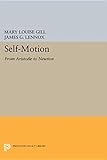Self-Motion : From Aristotle to Newton / ed. by James G. Lennox, Mary Louise Gill.
Material type: TextSeries: Princeton Legacy Library ; 5197Publisher: Princeton, NJ : Princeton University Press, [2017]Copyright date: ©1994Description: 1 online resource (390 p.) : 6 line illusContent type:
TextSeries: Princeton Legacy Library ; 5197Publisher: Princeton, NJ : Princeton University Press, [2017]Copyright date: ©1994Description: 1 online resource (390 p.) : 6 line illusContent type: - 9781400887330
- Movement (Philosophy)
- PHILOSOPHY / History & Surveys / Ancient & Classical
- Abstract and concrete
- Ad hominem
- Agency (philosophy)
- Akrasia
- Ambiguity
- Analogy
- Apprehension (understanding)
- Aristotelianism
- Aristotle
- Asymmetry
- Averroes
- Begging the question
- Causal chain
- Causal model
- Causality
- Concept
- Conflation
- Consciousness
- Contradiction
- Counterfactual conditional
- Determinism
- Direct evidence
- Disposition
- Dualism (philosophy of mind)
- Duns Scotus
- Ex nihilo
- Existence
- Explanation
- Explanatory power
- Extrapolation
- First principle
- Formal distinction
- Four causes
- Free will
- Frugality
- Good and evil
- Great chain of being
- Haecceity
- Immanence
- Individuation
- Inference
- Instant
- Intentionality
- Ipso facto
- Lightness (philosophy)
- Logical possibility
- Materialism
- Mechanics
- Moral responsibility
- Naturalness (physics)
- Neoplatonism
- Nous
- Objectivity (philosophy)
- On Generation and Corruption
- On the Soul
- Ontology
- Original meaning
- Parallelogram of force
- Perpetual motion
- Peter Olivi
- Phenomenon
- Philosopher
- Philosophical theory
- Philosophy of language
- Philosophy
- Physics (Aristotle)
- Physics
- Posterior Analytics
- Potentiality and actuality
- Propositional function
- Proximate cause
- Rational animal
- Rationality
- Reality
- Reason
- Received view
- Reductionism
- Regress argument
- Scholasticism
- Sophistication
- Square of opposition
- Stoic physics
- Stoicism
- Substantial form
- Suggestion
- Superiority (short story)
- Supervenience
- Syllogism
- Teleology
- The Freedom of the Will
- The Philosopher
- Theory of Forms
- Theory of justification
- Theory
- Thought
- Tu quoque
- Unmoved mover
- Vital heat
- W. D. Ross
- Wickedness
- 116 23
- B491.M6 S45 2017eb
- online - DeGruyter
| Item type | Current library | Call number | URL | Status | Notes | Barcode | |
|---|---|---|---|---|---|---|---|
 eBook
eBook
|
Biblioteca "Angelicum" Pont. Univ. S.Tommaso d'Aquino Nuvola online | online - DeGruyter (Browse shelf(Opens below)) | Online access | Not for loan (Accesso limitato) | Accesso per gli utenti autorizzati / Access for authorized users | (dgr)9781400887330 |
Frontmatter -- Contents -- Preface -- Abbreviations -- Introduction -- Part I. Aristotle -- Chapter 1. Self-Movers -- Chapter 2. Aristotle on Self-Motion -- Chapter 3. Aristotle on Perception, Appetition, and Self-Motion -- Chapter 4. Self-Movement and External Causation -- Chapter 5. Aristotle on the Mind’s Self-Motion -- Chapter 6. Mind and Motion in Aristotle -- Chapter 7. Aristotle’s Prime Mover -- Chapter 8. Heavenly Motion and the Unmoved Mover -- Part II. The Aristotle Tradition -- Chapter 9. Self-Motion in Stoic Philosophy -- Chapter 10. Duns Scotus on the Reality of Self-Change -- Chapter 11. Ockham, Self-Motion, and the Will -- Chapter 12. Natural Motion and Its Causes: Newton on the “Vis Insita” of Bodies -- Contributors -- Bibliography -- Index Locorum -- General Index
restricted access online access with authorization star
http://purl.org/coar/access_right/c_16ec
The concept of self-motion is not only fundamental in Aristotle's argument for the Prime Mover and in ancient and medieval theories of nature, but it is also central to many theories of human agency and moral responsibility. In this collection of mostly new essays, scholars of classical, Hellenistic, medieval, and early modern philosophy and science explore the question of whether or not there are such things as self-movers, and if so, what their self-motion consists in. They trace the development of the concept of self-motion from its formulation in Aristotle's metaphysics, cosmology, and philosophy of nature through two millennia of philosophical, religious, and scientific thought. This volume contains "Self-Movers" (David Furley), "Aristotle on Self-Motion" (Mary Louise Gill), "Aristotle on Perception, Appetition, and Self-Motion" (Cynthia Freeland), "Self-Movement and External Causation" (Susan Sauvé Meyer), "Aristotle on the Mind's Self-Motion" (Michael Wedin), "Mind and Motion in Aristotle" (Christopher Shields), "Aristotle's Prime Mover" (Aryeh Kosman), "The Transcendence of the Prime Mover" (Lindsay Judson), "Self-Motion in Stoic Philosophy" (David Hahm), "Duns Scotus on the Reality of Self-Change" (Peter King), "Ockham, Self-Motion, and the Will" (Calvin Normore), and "Natural Motion and Its Causes: Newton on the 'Vis Insita' of Bodies" (J. E. McGuire).Originally published in 1994.The Princeton Legacy Library uses the latest print-on-demand technology to again make available previously out-of-print books from the distinguished backlist of Princeton University Press. These editions preserve the original texts of these important books while presenting them in durable paperback and hardcover editions. The goal of the Princeton Legacy Library is to vastly increase access to the rich scholarly heritage found in the thousands of books published by Princeton University Press since its founding in 1905.
Mode of access: Internet via World Wide Web.
In English.
Description based on online resource; title from PDF title page (publisher's Web site, viewed 27. Jan 2023)


